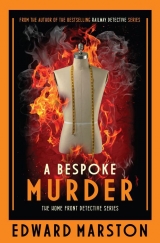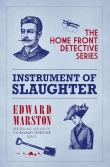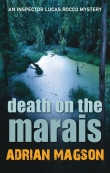
Текст книги "A Bespoke Murder"
Автор книги: Edward Marston
Жанр:
Классические детективы
сообщить о нарушении
Текущая страница: 10 (всего у книги 18 страниц)
CHAPTER THIRTEEN
Herbert Stone would never win any awards for patience. Once his brother’s funeral was over, and once he felt that he’d convinced Ruth of the seriousness of her sin in attempting suicide, he turned his attention to the investigation once more. Instead of hounding Harvey Marmion directly, he went over the inspector’s head and spoke to the commissioner. They met in the latter’s office at Scotland Yard. Sir Edward Henry gave details of the progress made so far but was unable to announce the arrest either of the killer, or of the man believed to have used petrol to accelerate the blaze. Stone was peeved.
‘Why is it taking so long, Sir Edward?’
‘Evidence has to be pieced together bit by bit.’
‘Put more detectives on the case,’ suggested Stone.
‘That’s not possible,’ explained the commissioner. ‘The events in Jermyn Street are not the only crimes with which we have to deal. There are scores of other cases demanding urgent attention. I’m doing my best to deploy my men to the best advantage but – with a depleted force – I can’t spare any more of them at the moment.’
‘Perhaps I should hire some private detectives.’
‘That’s your right, of course, but I wouldn’t advise it. No private detective has the resources that Scotland Yard can offer, nor the experience of someone like Inspector Marmion. You seem to have forgotten that he’s already solved one serious crime,’ said Sir Edward. ‘Incidentally, how is your niece?’
Stone’s face darkened. ‘Ruth is still suffering badly.’
‘Was she heartened by the news of the two arrests made?’
‘She will be in due course – when she’s pulled herself together.’
‘I’ve dealt with victims of crime for many years,’ said the commissioner, ‘and what I’ve noticed is that their greatest need is for reassurance. They want to feel safe and that the outrage will not occur again. It’s only after those two imperatives have been met that they begin to think about punishment for the offenders.’
‘I’ve thought about nothing else,’ said Stone, icily.
‘In arresting the two men, we’ve given your niece some peace of mind. They no longer represent a threat to her. The healing process can finally begin.’
‘It may not be as easy as that, Sir Edward.’
‘Why not?’
‘Ruth is an unusually sensitive girl.’
Stone did not tell him about the despair into which his niece had sunk, nor did he mention the abortive attempt at killing herself. They were private matters that had to be kept strictly within the family. What he did explain was that, hopefully, Ruth’s brother was on his way home. Stationed with his regiment in Mesopotamia, Daniel Stein had missed his father’s funeral and there was no certainty that word of it had actually reached him because the expedition was on the move. Writing to his nephew’s commanding officer, Stone had asked for compassionate leave so that Daniel could return home to mourn with the rest of the family. He and his sister had always been close. Stone believed that seeing him again might help to bring Ruth out of her depression. Before that could happen, however, Daniel would have to make the long and perilous journey home.
‘This war has played havoc with families,’ observed Sir Edward. ‘And as far as I can see, there’s no end in sight.’
‘Daniel is needed here. I expressed that need in the strongest terms, yet I still haven’t had a response.’
‘Correspondence does go astray, I fear.’
‘Then I’ll keep on sending word until it gets through.’
‘You do that, Mr Stone. Perseverance is everything.’
They chatted for a few more minutes then Stone rose to leave. After a farewell handshake, he moved to the door, pausing when he remembered something.
‘You might tell Inspector Marmion that I’m considering the hire of private detectives,’ he said.
‘Why should I do that?’
‘It might act as a spur to him if he knows he has competition.’
‘Nobody can compete with the inspector,’ said Sir Edward.
‘It won’t be the first time I’ve had to take matters into my own hand,’ explained Stone, pointedly. ‘When one of my warehouses was razed to the ground, I realised that I couldn’t rely on police protection. That’s why I’ve brought in a private firm to guard my property.’ He arched an eyebrow. ‘You might mention thatto the inspector as well.’
When both interviews were concluded, the detectives discussed them over a cup of coffee. Marmion felt that he’d had the more productive session, picking up a whole new line of inquiry from Cyril Burridge. Keedy was as astonished as the inspector had been that the name of Herbert Stone was put forward as a possible suspect.
‘Mind you,’ said Keedy, thoughtfully, ‘it does chime in with something that Howard Fine told me.’
‘What was that, Joe?’
‘The person who booted him out of a job was Herbert Stone.’
‘Who gave him the right to do that?’
‘He just took it.’
‘That decision should surely have lain with Jacob Stein.’
‘I put that point to Fine.’
‘What was his response?’
‘He said that Stone was always poking his nose into the shop and asking to see the accounts. He obviously has some stake in the company but Fine didn’t know what it was.’
‘We need to dig a little deeper on that front.’
Keedy shook his head. ‘No,’ he said, ‘I can’t accept that Stone is behind it all. What possible motive would he have for killing his brother and seeing the premises go up in smoke? Unless the place was heavily insured, of course – can we find out if it was?’
‘I’ve already sent someone off to do just that,’ said Marmion. ‘And I agree that Stone would not be my prime suspect either. On the other hand, we didn’t see any sign of grief when he realised that his brother might be dead. I’d be devastated if anything like that had happened to Ray.’
‘How is your brother?’
‘He’s still doing good work in the name of the Salvation Army.’
Keedy grinned. ‘Brass bands and soup kitchens, eh?’
‘Don’t mock them, Joe. They relieve distress. How many people can you say that about?’
‘Very few.’
‘There you are, then.’
‘No disrespect to your brother but I think that people in the Salvation Army are holy fools – full of good intentions, yes, but altogether too misguided.’
‘I must remember to invite you over next time that Ray and Lily come to tea. By the end of the meal, I guarantee, they’ll have you banging the tambourine and singing hymns as loud as anyone.’
‘Don’t bet on that.’
‘You’re ripe for conversion,’ teased Marmion.
‘Oh no I’m not,’ said Keedy with a chuckle. ‘But since we’re on the subject of tea at the Marmion household, I haven’t really thanked you for inviting me last Sunday. Please pass on my thanks to the family.’
‘It was good to see you off duty, Joe.’
‘I could say the same about you. And it was lovely to see Ellen and Alice again. They both looked wonderful. I had a long talk with your daughter,’ he said, recalling their time alone in the kitchen. ‘Alice is so intelligent. I can see why she frightens most men off.’
‘I’m still not sure if that’s good or bad.’
‘She seems perfectly happy with things as they are.’
‘That’s true.’
‘Alice told me that her mother wants grandchildren.’
‘They can wait,’ said Marmion, philosophically.
‘Not indefinitely.’
‘The right time will come.’
‘The right time or the right man?’
Marmion smiled. ‘Ideally, both of them will arrive together.’
It was a cloudy day and the promise of rain encouraged Alice Marmion to walk briskly along the pavement. She was on her way home from school and her bag was bulging with the books she had to mark. It was impossible to miss the signs of war all around her. At the outbreak of the conflict, there had been little visible difference in the streets beyond the fluttering of a few Union Jacks. Flags were much more in evidence now and so were people in uniform. Recruiting posters stared down from advertising hoardings. Walls were daubed with patriotic slogans. As a young man limped past on crutches, Alice knew that he’d lost his leg somewhere in combat, one of an untold number of amputees invalided out of the forces.
She arrived home to see her mother hunched over a newspaper.
‘I thought you’d stopped reading the paper, Mummy.’
‘I tried to,’ said Ellen, ‘but, whenever I go shopping, people are talking about the latest news. If I want to join in the discussion, I have to make an effort to keep up.’ She looked up. ‘Good day at school?’
‘Yes,’ said Alice, ‘it was very good, as it happens.’
‘The children are lucky to have a teacher like you.’
‘That’s what I keep telling them.’
Ellen’s tone was meaningful. ‘It’s what you do best.’
‘All right, Mummy, don’t labour the point. You’ve said all there is to say on the subject of my future. Why not wait until I’ve actually made my decision?’
‘I’m hoping your pupils will make it for you.’
Alice put down her bag and went into the kitchen to fill the kettle. After she’d lit the gas and put the kettle on the hob, she came back into the living room. Ellen was still reading a report.
‘Do they say anything about that Zeppelin raid we had in London last night?’ asked Alice.
‘Yes – it’s the first of many according to this. It’s terrifying when you think about it,’ said Ellen. ‘It’s not enough for the Germans to fight on land and sea. Now they want to drop bombs on us from the sky. It’s inhuman.’
‘It’s no more than we’ll do to them in time.’
‘Every day brings more bad news. First, it was all those setbacks in Gallipoli and now it’s the fighting in Flanders. The battle of Ypres keeps going on and on.’
‘Daddy and Joe Keedy were fortunate not to get too close to it.’
‘They got close enough.’
‘What does it say in the paper?’
‘It just lists the casualty figures. It’s not one big battle but a series of small ones in the northern sector of something called the Ypres Salient. It started last month when the German 4 thArmy attacked the Allied front line.’ She peered at the article. ‘I’m not sure if I’m pronouncing it right but it was the Battle of Gravenstafel Ridge. That’s when they began to use gas attacks.’ Ellen put the paper aside. ‘I can’t read any more. I keep thinking about Paul.’
‘He’s nowhere near Ypres, Mummy.’
‘How do you know that? He may have been moved.’
‘Worrying will get us nowhere.’
‘I tell myself that every day, Alice, but I still fret over your brother. He has his whole life ahead of him. It would be cruel if-’
‘I know,’ interrupted Alice, ‘but it’s the same for every other family with sons in the army. All we can do is to watch and pray.’
Ellen gave a resigned nod and went off into the kitchen. Alice took the opportunity to pick up the paper and read the main stories. The news was dispiriting. Vast amounts of money and manpower were being dedicated to the task of winning small amounts of territory. It seemed pointless to her. Lives were being uselessly sacrificed for what appeared to be minimal gains. Her brother’s letters talked of the severe deficiencies experienced by those in the trenches, yet he was not in a combat zone. Alice thought how much worse it must be for those compelled to lurk in a hole in the ground until someone blew a whistle and ordered them to race towards the enemy machine guns. Like her mother, she could not bear to read too much and set the paper aside. When Alice finally went into the kitchen, Ellen was pouring hot water into the pot. She slipped the tea cosy into position.
‘Your father is so glad that Joe Keedy didn’t join up,’ she said.
‘Lots of other policemen did.’
‘I know, Alice.’
‘You don’t go into the police force unless you like some sort of physical action and the best place to get that is in a war.’
‘Your father thinks very highly of Joe. He says that he’s going to be an outstanding detective.’
‘He’s got a good teacher in Daddy.’
‘The very best,’ said Ellen with a proud smile.
She put milk into two cups then used the strainer as she poured tea into them. Ellen added sugar before stirring. They took their tea back into the living room and sat down.
‘You have to feel sorry for Joe, I suppose,’ said Ellen.
‘Why?’
‘Well, I didn’t know this until your father mentioned it. I thought that what stopped Joe from joining the army was a desire to stay at Scotland Yard.’
‘I thought that as well.’
‘There was another reason, Alice. It seems that he’s been seeing a young lady for some time – a nurse at St Thomas’ Hospital.’
‘Oh.’ Alice was shocked. ‘I didn’t know that.’
‘Joe didn’t want to go abroad for months on end,’ said Ellen. ‘The irony is that his plan has backfired.’
‘I don’t follow.’
‘She’sthe one who volunteered to go to the front. While Joe is left here, his young lady is on her way to work in a field hospital. That was why he was able to come to tea on Sunday, you see. Since she’s no longer here, Joe was at a loose end.’
The news was like a punch in the stomach for Alice. She had fond memories of her time alone with Keedy and felt that he’d enjoyed her company as well. Now, it appeared, she was merely a distraction for him while his beloved was abroad. The faint hope she’d started to nurture was snuffed out like a candle. It was a painful moment.
Since she was at home all day for the rest of the week, Irene tried to make herself useful, helping to clean the house and offering to do some shopping. When she asked Miss James if there was anything she could get for her while she was out, the old lady surprised Irene by joining her on the outing. They left the house together and walked arm in arm. Miss James carried her white stick and used it to tap the pavement in front of her. Irene soon got used to the sound it made. She also grew accustomed to the regular greetings that Miss James attracted from passers-by. The old lady was clearly an established figure in the area. She recognised all the voices and was able to put names to faces. There was something oddly comforting about it. Irene wondered how long it would take her to acquire the same sort of popularity in the community. She tried to memorise the names of the various people who spoke to Miss James.
It was a long walk to the shops but the old lady made no complaint about that. She was much more robust than she looked and kept up a steady pace. It was when they turned into the main road that Miss James stopped.
‘Is he still there, Mrs Bayard?’ she asked.
‘Who do you mean?’
‘Someone has been following us since we left the house.’
Irene looked over her shoulder. ‘I don’t see anyone.’
‘Oh, he’s there somewhere.’
‘How do you know that, Miss James?’
‘There’s nothing wrong with my ears, dear.’
They walked on until the shops came into view but it was no longer a pleasant stroll for Irene. She was on edge. Every few seconds she looked uneasily behind her. There was nobody in sight but she trusted the old lady’s instinct. Someone hadfollowed them. She was sure of that now and it was unsettling.
Marmion found time that afternoon to call on the commissioner in order to bring him up to date on the progress of the investigation. Sir Edward Henry was wearing one of Jacob Stein’s suits over a white shirt with a wing collar. His black shoes were gleaming. Marmion wished that he could look as elegant but his build seemed to vitiate any attempt at being stylish. He told the commissioner about the interviews with the two former employees of the firm. Sir Edward was startled to hear that one of them had pointed the finger of suspicion at Herbert Stone.
‘That’s a preposterous suggestion,’ he said.
‘It may seem so on face value, Sir Edward, but I still think we should pay some heed to it. Mr Stone was clearly more involved with his brother’s business than we imagined.’
‘What could he possibly gain by his brother’s death?’
‘That’s what we need to find out,’ said Marmion.
‘Then you’re going on a wild goose chase, Inspector,’ said the commissioner with clear disapproval. ‘My advice would be to look elsewhere for suspects. I’d exonerate Mr Stone from any connection with the destruction of the shop in Jermyn Street.’
‘Then why did Mr Burridge direct our attention at him?’
‘It must have been done out of spite.’
‘He didn’t strike me as a spiteful man.’
‘You said that he was singularly unhelpful.’
‘Exactly, Sir Edward – that’s why we should take seriously the one piece of information that he gave voluntarily.’
The older man snapped his fingers. ‘I’d dismiss it like that.’
‘Mr Stone’s role in the business will bear investigation,’ said Marmion, doggedly. ‘The more we know about the politics inside that shop, the better we’ll be able to understand what was going on.’
‘This case is nothing to do with what was insidethe shop,’ said the other. ‘It was provoked by the German name on the outside. Yes, I know that you think that the murder was orchestrated but I’m coming around to the view that it was a random act by an opportunist who went upstairs to rob the safe.’
‘How would an opportunist know where the safe was kept?’
The commissioner pondered. ‘I can’t answer that, Inspector.’
‘And why stab Mr Stein to death? From what we’ve learnt about him, he was not a strong man. Someone who wanted to grab the contents of the safe could easily have brushed him aside.’
‘It took years to build up that business, remember. However unequal the odds, I don’t think Mr Stein would have given up without a fight. That was probably his undoing,’ said Sir Edward. ‘If he’d let the man take what he wanted and concentrated on escaping a burning building, he’d still be alive today.’
‘I very much doubt that,’ insisted Marmion.
Rather than start an argument with him, the commissioner decided that they should agree to differ. He told Marmion about Stone’s visit and his threat to hire private detectives to handle the case. The inspector found the news interesting but unsurprising.
‘I told him that no private detective had our resources,’ said Sir Edward, ‘and would certainly not have your abilities.’
‘Mr Stone is not entirely persuaded of my abilities, I fear.’
‘Then he should be. You identified, chased and arrested the two villains implicated in the rape of his niece. There’s not a private detective alive who could have got the authorisation that weobtained.’ Sir Edward plucked at his moustache. ‘I should have made that point to Mr Stone. It beats me why he should even entertain the notion of hiring private help. It would have no positive value to him.’
‘Yes, it would, Sir Edward,’ said Marmion. ‘Mr Stone can controla private detective. He can’t control us.’
‘You’re imputing a very dark motive to him.’
‘We have to look at this case from every conceivable angle.’
‘Are you saying that he’d deliberately muddy the waters?’
Marmion was firm. ‘I’m ruling nothing out.’
‘Well,’ said the commissioner, ‘it’s not for me to interfere. You’re in charge. All that I can do is to offer advice. With regard to Mr Stone, I believe that you’re barking up the wrong tree but … only time will tell which of us is right.’ He brushed a speck of dust from his sleeve. ‘What does Sergeant Keedy feel?’
‘He’s sticking to his theory that there’s an anti-Semitic element.’
‘Is he following up that line of inquiry?’
‘He is, Sir Edward,’ said Marmion. ‘His first port of call is a man I could not recommend more highly.’
‘Why is that, Inspector?’
‘He’s my brother, sir – Major Marmion of the Salvation Army.’
Raymond Marmion had been a committed Salvationist for a long time and had been promoted to the rank of major after fifteen years as an officer in the organisation. The silver crest on his uniform denoted his status. Younger than his brother, he had the same solid frame and an open face with the sheen of religiosity. His receding hair threw the high-domed forehead into prominence. Though he had heard a great deal about Marmion’s brother, Keedy had never met him before and he was struck both by the similarities between the two men and by their glaring differences. They met in Raymond’s tiny office in a ramshackle building. Keedy immediately noticed the graze on the other man’s temple.
‘No,’ said Raymond, touching the wound gingerly, ‘my wife has not been attacking me with a beer bottle. Lily would never do that. I was hit by a stone while trying to help someone up from the pavement. It’s not the first time that’s happened, unfortunately.’
‘You’re a brave man to work here,’ complimented Keedy. ‘The East End is a jungle at times. If the kids are not hurling missiles at you, they’re trying to knock helmets off policemen on the beat. They have no respect for authority.’
‘And still less for the word of God, alas. But,’ Raymond went on, ‘you didn’t come here to discuss our mission. I take it that my brother sent you here. How can I help?’
Keedy did not need to give full details of the case in hand. Since he always kept an eye on his brother’s work, Raymond had been following its progress in the newspapers. He gave a sympathetic hearing to Keedy’s theory then opened a drawer in the table to take out a sheaf of papers. He found the relevant page.
‘This is what you need, Sergeant,’ he said.
‘What is it?’
‘It’s a list of organisations – tiny groups in some cases – that try to blame the woes of the world entirely on the Jews. We don’t have pogroms here, thankfully, but we have people who conduct their own forms of persecution. If you’ve been in the police force for any length of time,’ continued Raymond, ‘then I don’t need to tell you how much immigrants have suffered in the East End.’
‘I remember the riots from years ago,’ said Keedy.
‘Russians seemed to get the worst of it because of their large numbers. Many of them had been hounded out of their own country for committing the crime of being Jews. Eastern Europe in general drove them west.’ Raymond gritted his teeth. ‘They came with nothing, Sergeant – except hope, that is. It was soon extinguished.’ He handed the list over. ‘I’ll need to keep that but you’re welcome to jot down those names.’
Keedy studied the paper. ‘Very few seem to have addresses.’
‘That’s deliberate. They move around all the time, holding meetings in different places so that they can’t be tracked.’
‘How many of these groups are still active?’
‘It’s difficult to say,’ replied Raymond. ‘Some disappear for long periods then suddenly spring back to life. And, of course, the real militants may belong to a number of groups, shifting to the one that’s planning some action at any particular time.’
‘Beatings, destruction of property, poison pen letters?’
‘All that and much more – they had a field day when the Lusitaniawent down. That was a signal to go really wild. German homes and businesses were the principal targets but Jewish immigrants from other countries were caught up in the wave of violence. I speak from personal experience,’ said Raymond. ‘We sheltered some of them in this very building.’
‘Have things died down now?’
‘There are still rumblings below the surface.’
Taking out his notepad, Keedy copied the list onto a blank page. When he’d finished, he handed the sheet of paper back to Raymond.
‘Thank you, Major. You’ve been very helpful.’
‘I’m always ready to assist the police.’
‘The inspector has obviously got you well trained. I hope that we’ll be in a position to help you in return one day.’
‘Oddly enough, I was about to suggest that.’
‘Oh?’
‘Do you play a musical instrument, Sergeant?’
‘No,’ said the other, ‘I’m tone deaf.’
‘Then it sounds to me as if you’re better off with a bass drum. You’re strong enough to carry it and clever enough to beat it. Can we count on you joining our band on Sunday morning?’
Keedy was alarmed. ‘Hey, now hold on a moment,’ he said, backing away. ‘I’m not volunteering for the Salvation Army.’
‘Don’t you want to save sinners with rousing music?’ asked Raymond, grinning broadly. ‘It’s very rewarding work.’
‘I’ll take your word for it, Major.’
‘Our door is always open.’
‘The inspector warned me that you’d try to recruit me.’
‘I’ve been trying to recruit Harvey for almost twenty years but he says that he has important work to do.’ He indicated the crucifix on his collar. ‘What’s more important than serving Jesus Christ?’
The detective wisely chose not to reply. Although there was a humorous note in Raymond’s voice, Keedy had no wish to be drawn into an argument with him. Even on their brief acquaintance, he could see how plausible and persuasive Major Marmion was. Keedy had been brought up in the Anglican Church but rarely attended services now. Religion was something that had gradually faded from his life. It was not the moment to rekindle it.
Raymond gave him a firm handshake and pumped his arm.
‘It was a pleasure to meet you, Sergeant Keedy,’ he said.
‘The pleasure was mutual.’
‘You have a devoted admirer in the family.’
‘Oh,’ said Keedy, misunderstanding, ‘Inspector Marmion is not always full of admiration for me. If I make a mistake – and I do that from time to time – he comes down on me like a ton of bricks.’
‘I wasn’t talking about Harvey. I was referring to my niece.’
Keedy was jolted. ‘Alice?’
‘Who else? Your name often comes up when we all get together. Alice speaks very well of Joe Keedy.’
‘Thank you for telling me.’
The news brought a smile to his face and ignited a memory of their time together washing the dishes the previous Sunday. Until he turned up at the house, Keedy had forgotten how attractive Alice Marmion was. It had been months since he’d last seen her and she’d matured in the interim. It made him look forward with anticipatory delight to their next meeting. Conscious that Raymond was watching him, Keedy became serious and waved his pad.
‘This list will be extremely useful, Major,’ he said.
‘It’s not comprehensive, I fear. Old groups emerge in new forms all the time and some may consist of no more than a handful of people. Of one thing, however, I can assure you,’ said Raymond, seriously. ‘Anti-Semitism is as virulent as ever.’
They moved with speed. When the lorry drew up outside the synagogue, they jumped out and unloaded cardboard boxes filled with firewood and newspapers. The boxes were piled against the double doors. Then the man in the dungarees doused them liberally in petrol from a large can. Lighting a cigarette, he took a couple of puffs before tossing it into the biggest of the cardboard boxes. There was an immediate explosion and flames began dancing against the doors. Seconds later, the lorry sped off down the street.








